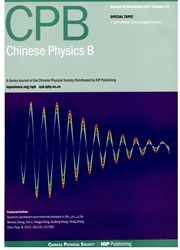

 中文摘要:
中文摘要:
Recently a great deal of effort has been made to explicitly determine the mean first-passage time(MFPT) between two nodes averaged over all pairs of nodes on a fractal network.In this paper,we first propose a family of generalized delayed recursive trees characterized by two parameters,where the existing nodes have a time delay to produce new nodes.We then study the MFPT of random walks on this kind of recursive tree and investigate the effect of the time delay on the MFPT.By relating random walks to electrical networks,we obtain an exact formula for the MFPT and verify it by numerical calculations.Based on the obtained results,we further show that the MFPT of delayed recursive trees is much shorter,implying that the efficiency of random walks is much higher compared with the non-delayed counterpart.Our study provides a deeper understanding of random walks on delayed fractal networks.
 英文摘要:
英文摘要:
Recently a great deal of effort has been made to explicitly determine the mean first-passage time (MFPT) between two nodes averaged over all pairs of nodes on a fractal network. In this paper, we first propose a family of generalized delayed recursive trees characterized by two parameters, where the existing nodes have a time delay to produce new nodes. We then study the MFPT of random walks on this kind of recursive tree and investigate the effect of the time delay on the MFPT. By relating random walks to electrical networks, we obtain an exact formula for the MFPT and verify it by numerical calculations. Based on the obtained results, we further show that the MFPT of delayed recursive trees is much shorter, implying that the efficiency of random walks is much higher compared with the non-delayed counterpart. Our study provides a deeper understanding of random walks on delayed fractal networks.
 同期刊论文项目
同期刊论文项目
 同项目期刊论文
同项目期刊论文
 期刊信息
期刊信息
